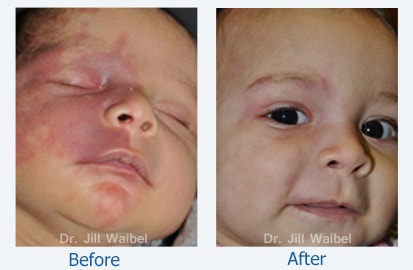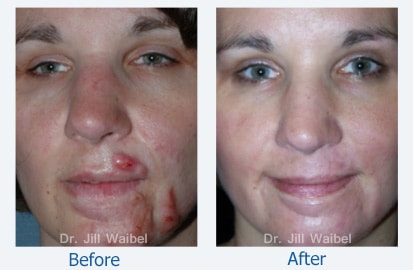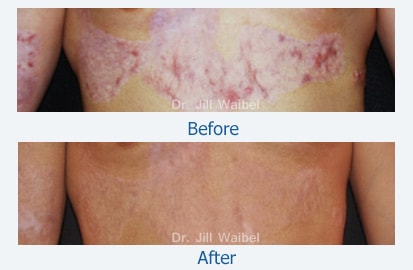Existing Patient Login | New Patient Login
7800 SW 87th Avenue, Suite B200
Miami, Florida, 33173 USA
Office 305.307.5787

Scar Removal and Treatments in Miami, FL
Treating scars can be a sensitive issue. In Miami, Ft. Lauderdale, and Kendall, FL, board-certified dermatologist Jill Waibel, MD, FACS, at Miami Dermatology and Laser Institute has earned an outstanding reputation for her accomplishments in scar revision surgery. Dr. Waibel provides a variety of advanced scar removal treatments to diminish the appearance of scar tissue in patients of all ages.What are scars?
Scar formation is a natural part of the skin’s healing process. After a significant injury or surgery that penetrates through the epidermis to the dermis, your skin heals by producing fibrous tissue called a scar. Such injuries can include cuts, scrapes, sores, burns, infections (such as chickenpox) or skin problems (such as acne). Scars may bother us because they don’t look or feel like normal tissue. They’re often pink, elevated, depressed, red or shiny. They can cause itching, tenderness, pain, and a decreased ability to move (range of motion). Furthermore, scar tissue doesn’t function like the healthy tissue it replaces – it’s often thicker and less flexible. Scars are composed of collagen, the same material present in healthy skin. But in scars, these fibers usually align in one direction rather than the random basket-weave pattern that gives normal skin its suppleness and strength. Scar tissue also does not regrow sweat glands and hair follicles, and it’s less resistant to stresses such as UV radiation. No one understands all the factors that affect scarring. But we do know several factors that influence how your skin scars. For example, broader, deeper wounds produce larger, thicker scars than small, superficial wounds. The location of your injury also plays a role. Places where the skin must stretch, such as the shoulder or chest, have a harder time healing. Many other factors, including your age, gender, genes, ethnicity and skin type, also affect how your skin heals after an injury.Can scars disappear?
Although some scars may improve over time, they never disappear completely. Even the smallest scar can affect the way you feel about yourself. Scars can be aesthetically unappealing, disfiguring, and, in some cases, emotionally devastating.How can scars be treated?
By properly identifying your scar, your dermatologist can treat the scar appropriately and provide proper counseling. People prone to scarring may want to discuss invasive cosmetic procedures and elective surgeries, and have strategies for scar prevention.- Keloid Removal
- Acne Scar Treatment
- Burn Scar Treatment
- Hypertrophic Scar Treatment
- Scar Revision
- Traumatic Scar
Dr. Jill Waibel and the other physicians at Miami Dermatology and Laser Institute proudly provide comprehensive cosmetic dermatology services to residents of Miami, Fort Lauderdale, Kendall, and nearby areas, as well as visiting patients from all over the U.S. Contact Miami Dermatology and Laser Institute to schedule your consultation today.



















